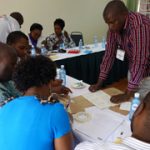Traffic is horrible on my drive back to Nairobi from a suburban town on the outskirts of the capital, where the Program on Sexual Violence in Conflict Zones at Physicians for Human Rights (PHR) has just finished its latest training on forensic documentation. Between the stop and go, I meditate to the drone of trucks brimming with goods from the coast and the brightly painted busses, all clamoring for passengers and space on the busy Mombasa Highway. My attempt at concentration is interrupted when my phone buzzes in my pocket. It’s a text from the participants of our recent training, inviting me to join a new social networking group for the medical-legal network they created just hours earlier. Only three days ago, these participants were largely strangers, meeting with our team for the first time to learn about documenting crimes of sexual violence. Their dedication is remarkable: as they sit in the same traffic on busses headed back to their neighborhoods, they are already building the medical-legal network that will ensure that survivors of sexual violence in their country receive justice.
PHR has helped local activists create numerous self-governing medical-legal networks across Kenya and the Democratic Republic of the Congo to help facilitate collaboration and cooperation among medical professionals, legal and judicial experts, the media, local communities, and NGOs. These networks allow local professionals to meet one another and work together to ensure that victims receive the care they need and that perpetrators are held to account.
During PHR’s three-day training, Joseph Kibet, a police officer, reflected on the value of the network he helped create in his home community of Eldoret, Kenya. He remarked, “You can never handle a survivor [of sexual violence alone]. You need other people. Being a police officer, I need a medical officer, I need a social worker, I need a community, my other colleagues in the police force, I need a prosecutor, and a judge.”
The power of community-driven medical-legal networks was best described to me by Dr. Edith Onyango, an obstetrician/gynecologist at Kenyatta National Hospital, who told me that the networks allow her to refer patients to specific individuals in the legal or law enforcement fields. She tells me that when survivors come to her hospital, she is able to tell them, “You will meet so-and-so, and you’ll be seen.” No longer forced to navigate a complex system alone, survivors are able to speak with a specific professional who has specialized skills for working with survivors of sexual violence. Soon, the daunting process becomes streamlined. The simple process of connecting the necessary professionals who then work together has a powerful impact on the lives of survivors.
As I put my phone away, I am brought back to the commotion of the busy highway and am once again lost in thought. I am inspired by this group of activists, who are now using their time stuck in gridlock to advance their work together. They are committed to providing survivors of sexual violence with the support they need, enabling not only the individual victims, but also entire communities, to heal. This is what activism really means: using every possible moment and the power of collaboration to advance the cause of justice.

